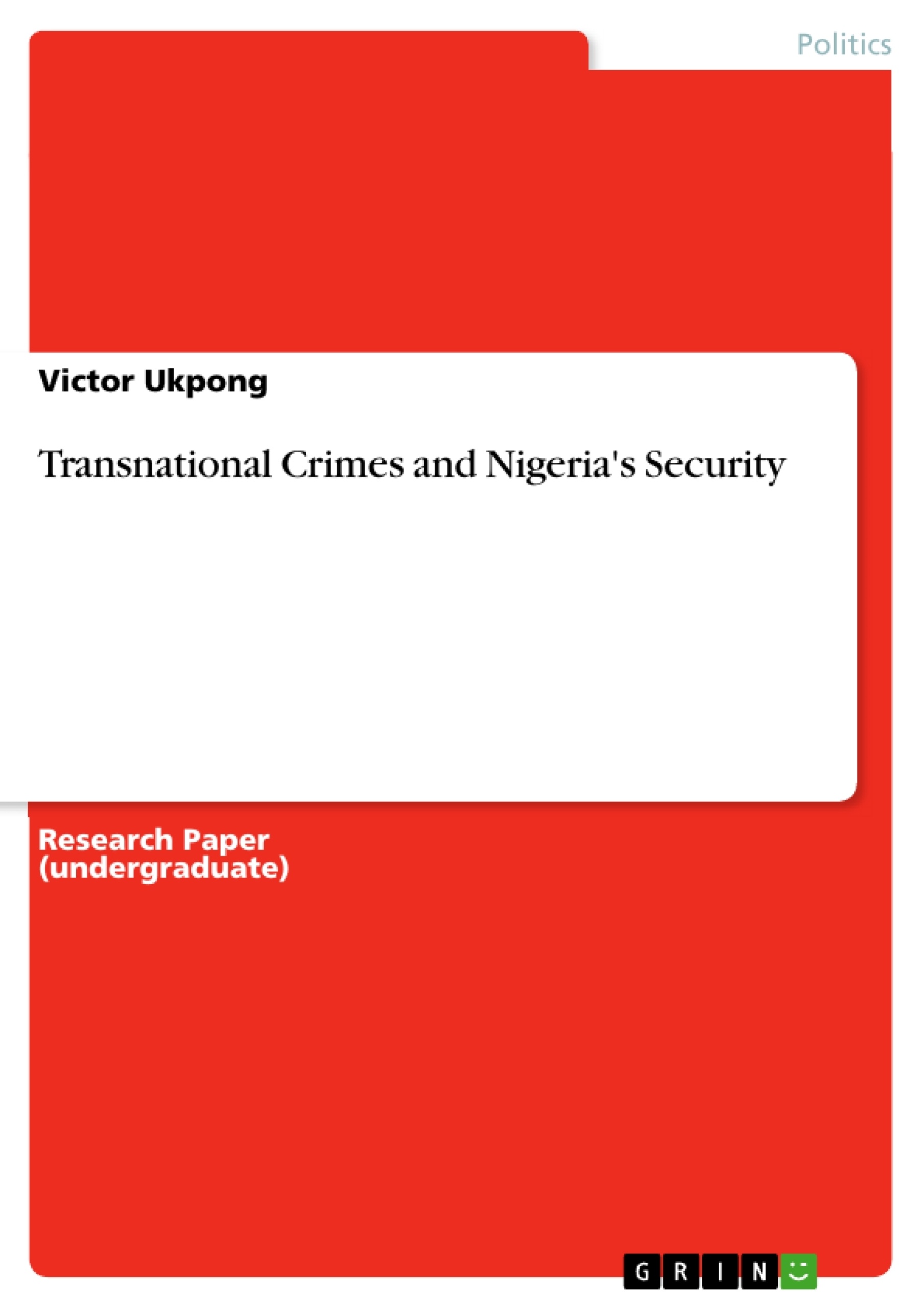This work articulates that Nigeria’s security is troubled by transnational crimes prevalent in West Africa by making an important argument that since West African states lack the capacity to uphold the basic demands of statehood within their territorial domains, they unavoidably serve as safe havens for trans-organized criminal networks, which has grave implications to Nigeria’s domestic concerns.
Inhaltsverzeichnis (Table of Contents)
- THESIS STATEMENT
- INTRODUCTION
- BACKGROUND TO TRANS-BORDER CRIMES IN WEST AFRICA
- THEORETICAL FRAMEWORK
- INSTITUTIONAL LAG
- CORRUPTION
- NATURE AND DYNAMICS OF TRANS-BORDER CRIME
- EFFECTS OF TRANS-BORDER CRIMES ON NIGERIA'S SECURITY
- TRANS-BORDER CRIME AND NIGERIA'S SECURITY
- ARMS TRAFFICKING AND NIGERIA'S SECURITY
- CONCLUSION
- REFERENCES
Zielsetzung und Themenschwerpunkte (Objectives and Key Themes)
This work investigates the challenges posed by transnational crimes in West Africa to Nigeria's security. It argues that the weak capacity of West African states to uphold statehood within their territories, due to factors such as corruption and institutional lag, creates safe havens for trans-organized criminal networks, with significant consequences for Nigeria's domestic security.
- The impact of transnational crimes on Nigeria's security
- The role of institutional lag and corruption in fostering transnational crime
- The dynamics of trans-border criminal networks in West Africa
- The consequences of transnational crimes for Nigeria's economic and social well-being
- The need for stronger regional cooperation to combat transnational crime
Zusammenfassung der Kapitel (Chapter Summaries)
The introduction highlights the significant security threats faced by Nigeria stemming from transnational crimes originating in other West African nations. It points to the porous borders and weak security frameworks in these countries, which facilitate illegal cross-border activities and create a permissive environment for criminal networks. The chapter discusses the impact of these activities on Nigeria's domestic security, including loss of lives and property, environmental damage, and the fueling of violence.
The chapter on the background of trans-border crimes in West Africa explores the historical roots of these activities, tracing them back to colonial exploitation and trade patterns. It examines the role of factors such as corruption, structural adjustment programs, and weak legal frameworks in promoting the growth of trans-border crime. The chapter also highlights the impact of economic crises in the 1980s on the rise of transnational crime and the use of these criminal activities by former combatants and criminals.
Schlüsselwörter (Keywords)
This work focuses on the challenges posed by transnational crimes to Nigeria's security, specifically exploring the impact of trans-border criminal activities in West Africa. Key terms include transnational crime, border security, institutional lag, corruption, arms trafficking, human trafficking, and regional cooperation. It investigates the factors contributing to the rise of these crimes, their effects on Nigeria's social and economic stability, and the need for effective strategies to combat these challenges.
Frequently Asked Questions
How do transnational crimes affect Nigeria's security?
Transnational crimes like arms trafficking and human smuggling fuel domestic violence, environmental damage, and threaten the overall stability of the Nigerian state.
Why is West Africa a haven for criminal networks?
Many West African states lack the capacity to uphold basic statehood, providing "safe havens" due to porous borders, weak security frameworks, and institutional lag.
What is the role of corruption in transnational crime?
Corruption weakens legal and security institutions, allowing criminal networks to operate across borders with impunity by bribing officials or bypassing regulations.
What are the dynamics of arms trafficking in the region?
Illegal arms flow from conflict zones and weak states into Nigeria, empowering insurgent groups and increasing the lethality of local conflicts.
How does "Institutional Lag" contribute to insecurity?
It refers to the inability of state institutions to keep pace with the evolving tactics of organized crime, leading to ineffective law enforcement and border control.
- Citar trabajo
- Victor Ukpong (Autor), 2017, Transnational Crimes and Nigeria's Security, Múnich, GRIN Verlag, https://www.grin.com/document/448584



